Covid cases rose nine per cent last week as schools reopened with children aged 10 to 19 testing positive nearly six times more than the elderly, official data has revealed.
Figures from Public Health England show cases in children in the age group spiked by 42 per cent in a week from 478.3 per 100,000 to 681.4 in the week ending September 5.
This compared to just 114 cases per 100,000 in the over-80s — down 1.2 per cent from the week before — and 145.8 in 70- to 79-year-olds — which remained flat.
But separate data from a symptom-tracking study that uses a different methodology suggested the overall number of people falling ill with the virus fell during the same week.
King’s College London’s ZOE Covid Study — which relies on people self-reporting symptoms — estimated 51,876 people suffered with the virus in the week ending September 4, down nine per cent on the previous week (57,158).
Children returned to schools on Wednesday last week in England, meaning the data for both reports only includes half a week of the start of term.
It takes at least a week for cases to start appearing because of how long it takes for the virus to incubate but the figures show symptomatic cases were already highest in people aged 18 and younger.
Overall cases in Scotland increased during the same period, where children were back in classes as early as August 18. Prevalence was also highest in school age children.
Professor Tim Spector, an epidemiologist and lead scientist of the study, said the return to classrooms ‘hasn’t yet caused a spike’ in infections.
Meanwhile separate figures from NHS Test and Trace showed a total of 191,431 people tested positive for Covid in England at least once in the week to September 1, down four per cent on the previous week. The number of people testing positive has been around 200,000 in the six most-recent weeks of data.
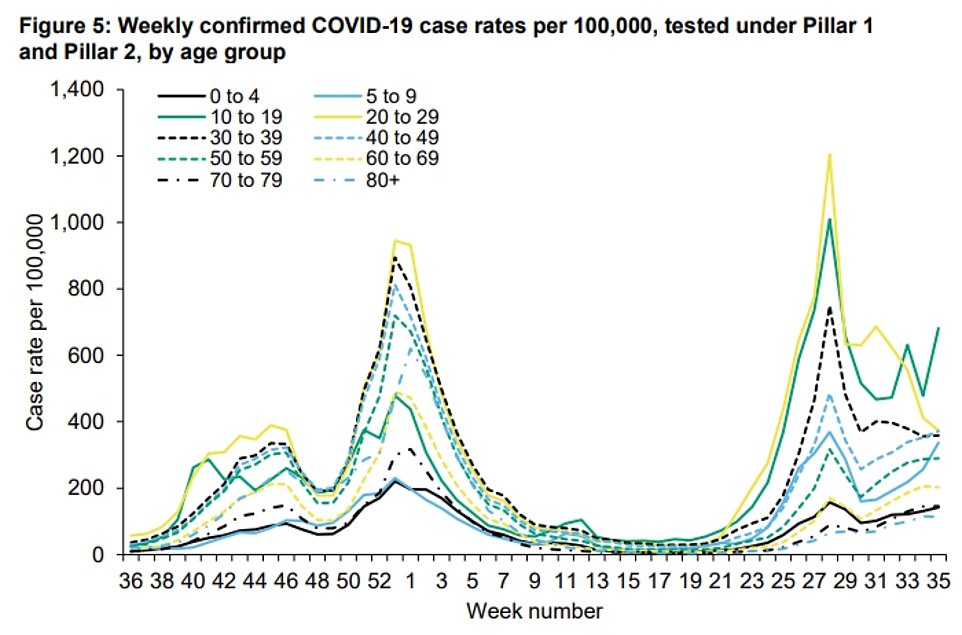
Figures from Public Health England show cases in children aged 10 to 19 spiked by 42 per cent in a week from 478.3 per 100,000 to 681.4 in the week ending September 5. This was nearly six times higher than the 114 cases per 100,000 in over-80s — down 1.2 per cent from the week before — and 145.8 in 70- to 79-year-olds — which remained flat

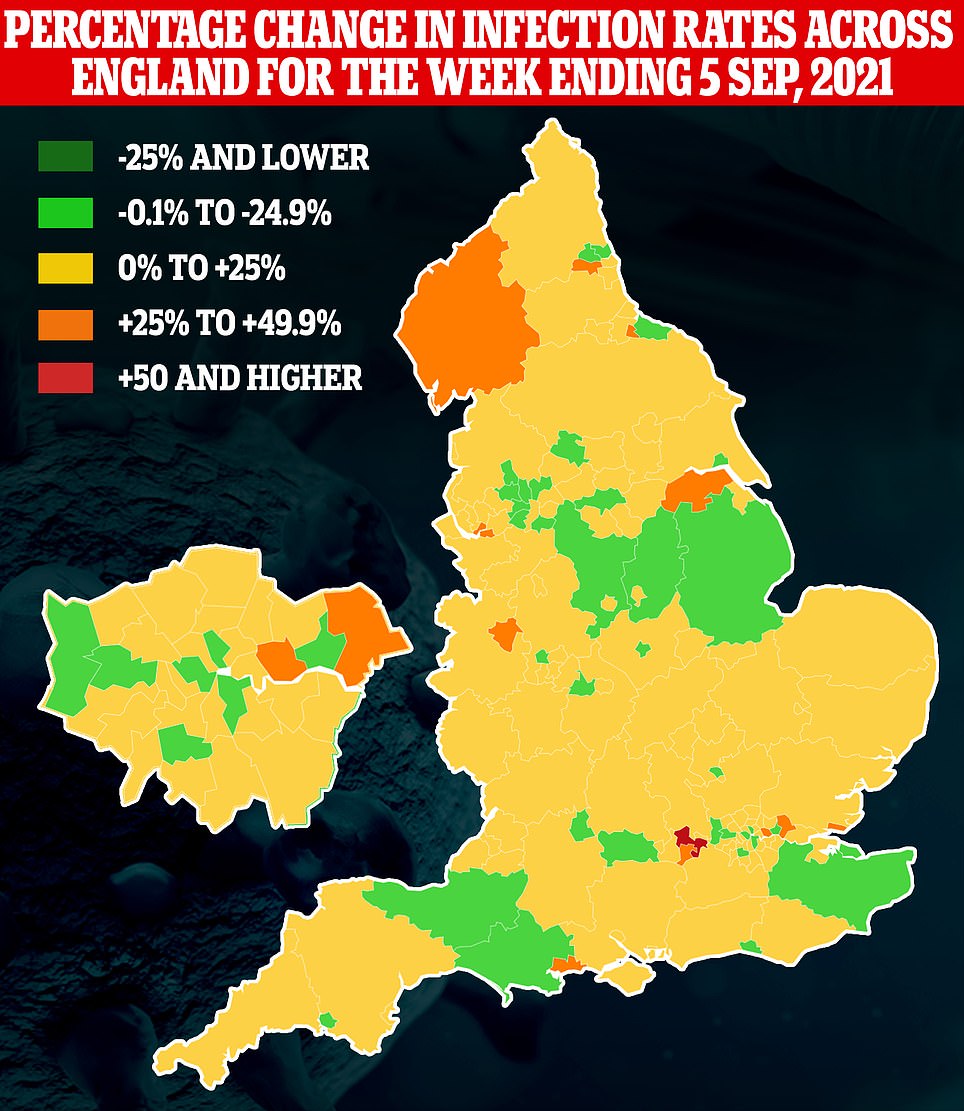 ‹ Slide me ›
‹ Slide me ›
Rates are rising in all regions of England except south-west England. Graph shows: The percentage change in infections in regions across England in the week ending September 5
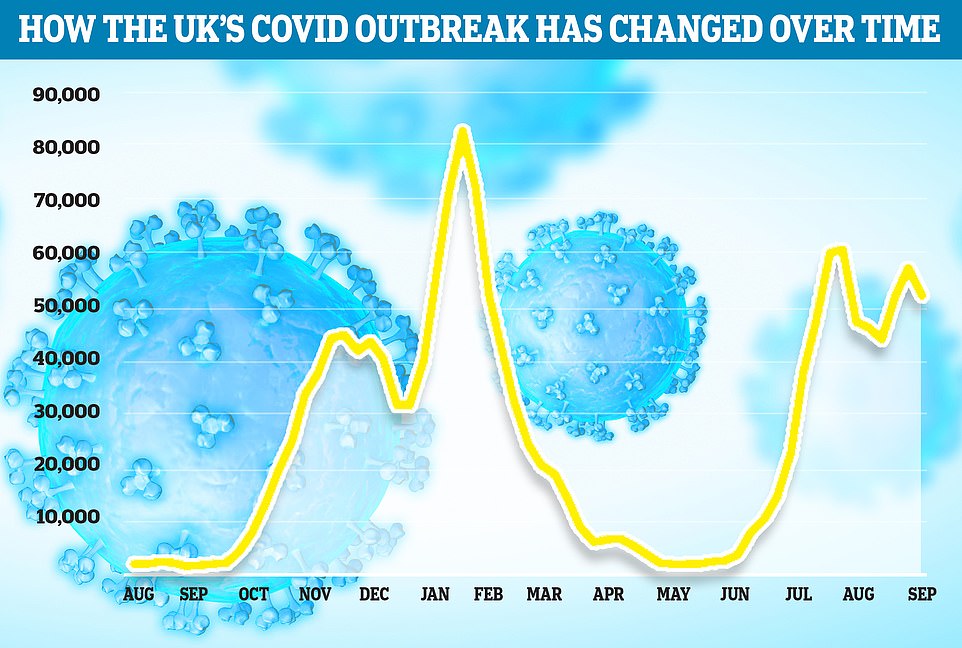
But separate data from King’s College London scientists suggested 51,876 people suffered with the virus in the week ending September 4, down nine per cent on the previous week (57,158)
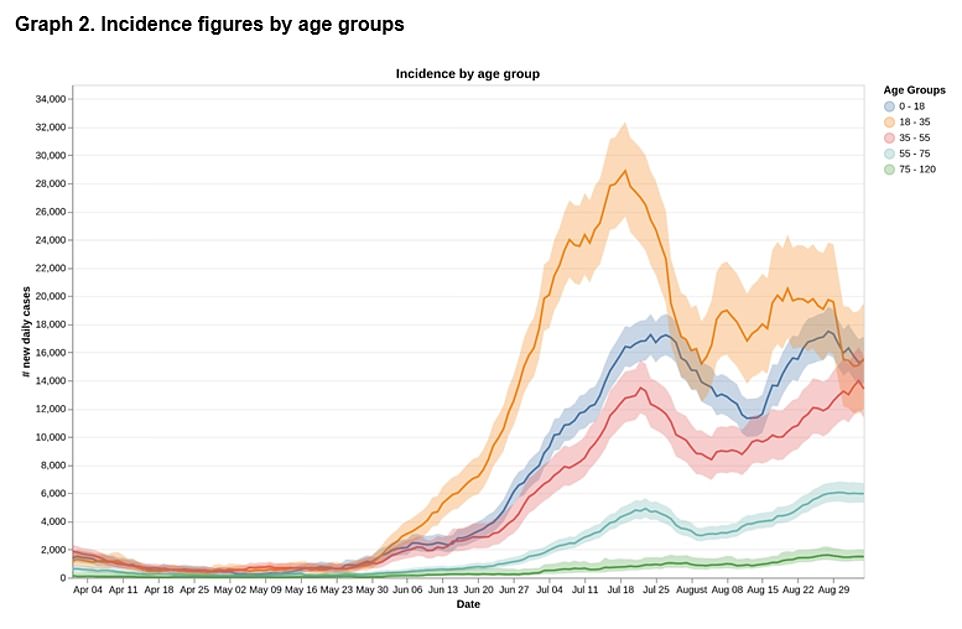
Symptomatic cases were highest in people aged 18 and younger, despite children only returning to schools on Wednesday last week in England
Pressure mounts for boosters as Scotland’s Covid hospital admissions rise 50% in a week
Pressure for a mass British booster vaccine programme continued to mount today as figures showed Scotland’s daily Covid hospital admissions rose by 50 per cent in a week.
Data from the Government’s Covid dashboard showed that on average there were 114 patients being admitted each day to hospitals in Scotland in the week to September 1, compared to 76 the week prior.
The number seeking treatment for the virus has risen steadily since schools went back from the summer break in the middle of August, when there were about 40 Covid admissions per day.
Daily hospitalisations are now at 60 per cent of the levels seen at the peak of the second wave, but patients are presenting with milder illness and being discharged quicker than earlier phases of the pandemic.
There were 883 Covid patients in hospital with the virus yesterday compared to more than 2,000 at the height of the winter wave in January — in a sign the vaccines are working.
Eighty-two patients were on mechanical ventilators by the most recent count on Wednesday and the country is recording seven deaths from the virus per day, on average.
The growing hospital numbers in Scotland come amid increasing calls for a more broad booster vaccine programme in the UK.
Advertisement
The PHE data shows overall the number of positive cases last week rose from 171,798 to 187,059.
Case rates in England are continuing to rise in most age groups, PHE said.
The exceptions are 20 to 29-year-olds, 60 to 69-year-olds and people aged 80 and over.
The highest rate is among 10 to 19-year-olds, with 681.4 cases per 100,000 people in the seven days to September 5, up sharply week-on-week from 478.3.
The second highest rate is among 20 to 29-year-olds, down from 412.1 to 373.2.
The lowest rate is among people aged 80 and over, at 114.0, down slightly from 115.4.
Rates are rising in all regions of England except south-west England, according to PHE.
North-east England has the highest rate, with 378.6 cases per 100,000 people in the seven days to September 5, up from 320.3.
Yorkshire and the Humber has the second highest rate at 378.4, up from 343.0.
London has the lowest rate at 240.0, up slightly from 237.5.
Dr Yvonne Doyle, Medical Director at Public Health England, said: ‘Case rates remain high although fairly stable across the country and are currently highest in those aged 10-19 years old.
‘We expect to see more cases in this age groups as schools detect cases of COVID-19 acquired during the summer holidays. We continue to closely monitor how the start of the school year is impacting infections and will review recommendations accordingly.
‘In recent days many have begun to return to the workplace.
‘It’s important to keep following the simple steps to help protect yourself and others, get both doses of the vaccine, wear a face covering in enclosed spaces and if you have Covid symptoms, please do not go out.
‘You should only leave home to get a PCR test, which you should get as soon as possible if you have symptoms.’
The ZOE Covid study data — which relies on self-reporting, meaning it is often ahead of the official curve due to the time it takes to process tests — showed one in 90 people across the UK currently have symptomatic Covid.
There are currently 17,674 new daily symptomatic cases among fully vaccinated people in the UK. Cases in the group had been rising steadily but have now stabilised, with last week’s figure being 17,342.
Professor Spector said: ‘It’s great to see the return to schools and summer festivals haven’t yet resulted in a spike in cases as feared.
‘However, the picture is worse in Scotland, where rates are still rising and our figures indicate that Scottish hospitals could soon be overwhelmed.
‘The Scottish situation makes it clear we can’t be complacent about Covid as winter approaches. We are still producing far too many Long Covid cases and hospitalisations unnecessarily.’
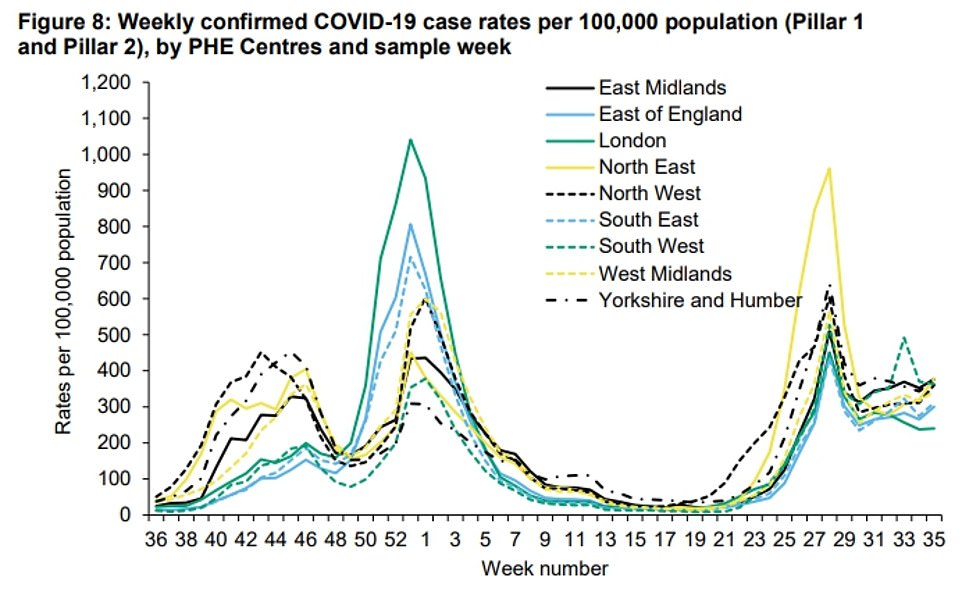
Rates are rising in all regions of England except south-west England, according to the latest weekly surveillance report from Public Health England
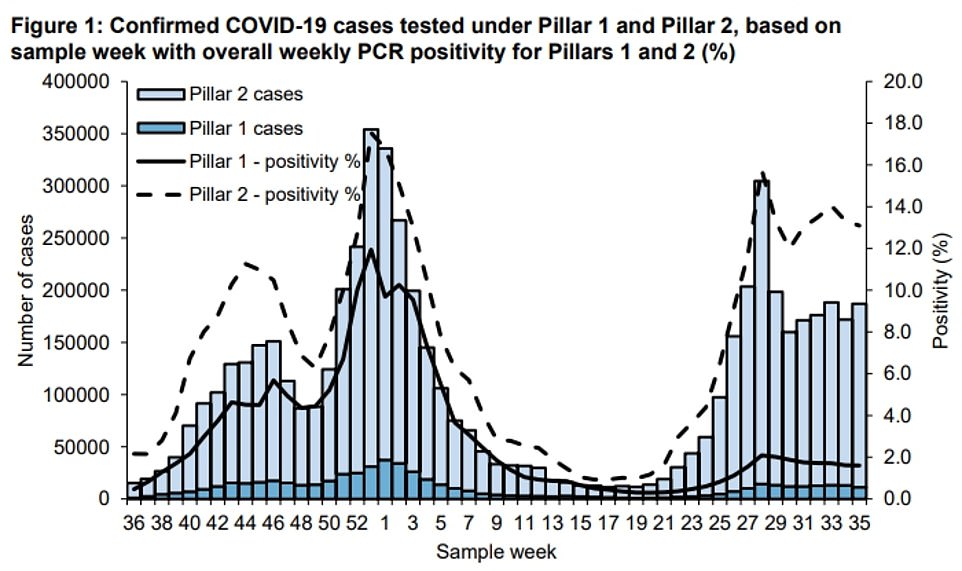
The PHE Surveillance Report showed cases across age groups (light blue bar) rose nine per cent last week as schools reopened
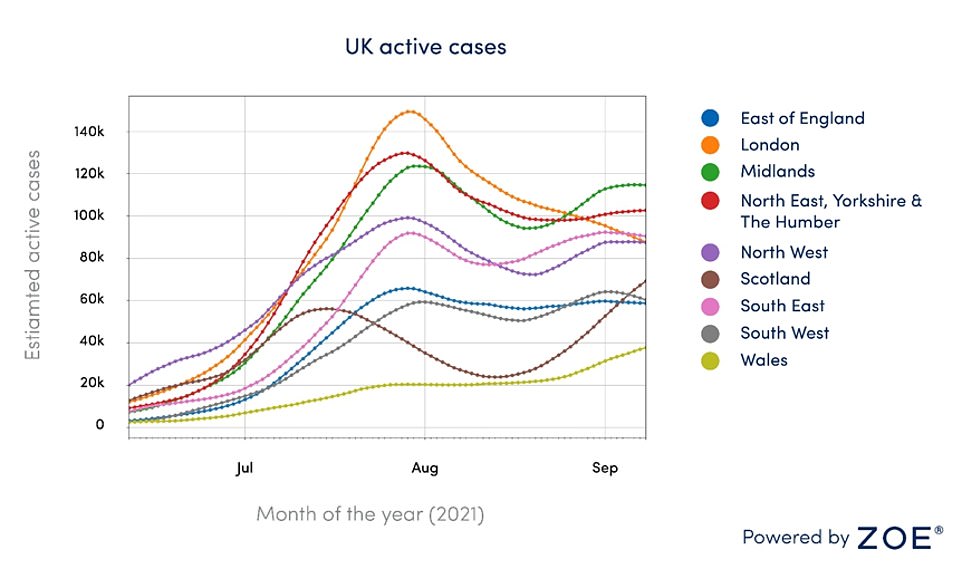
The Midlands has the highest number of total new cases in England with 8,070 per day. Graph shows: Estimated active cases in each region
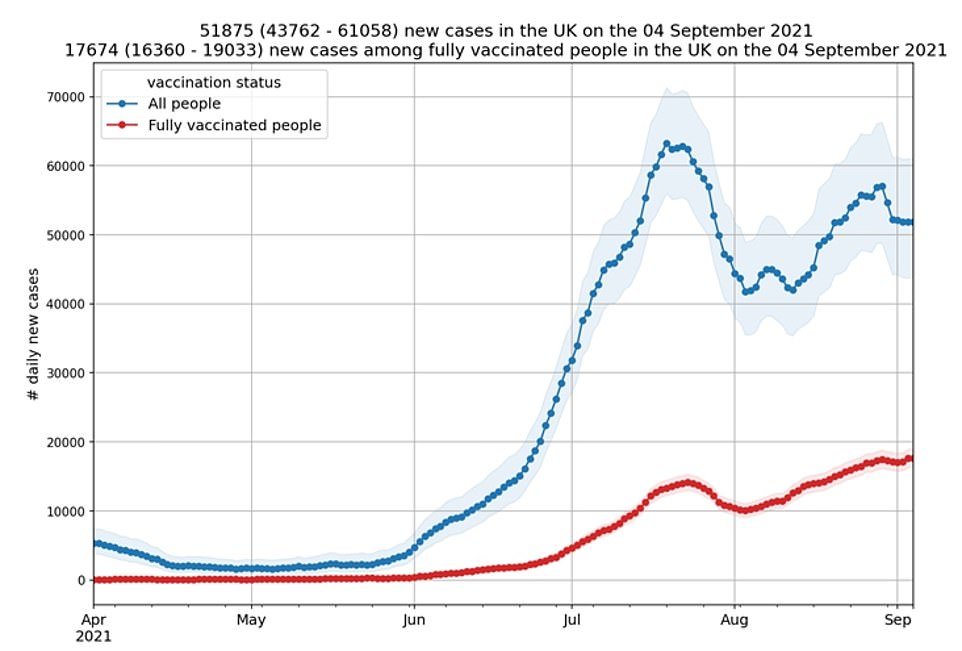
In the fully vaccinated population, it’s estimated there are currently 17,674 new daily symptomatic cases in the UK. Cases in this group had been rising steadily but have now stabilised, with last week’s figure being 17,342
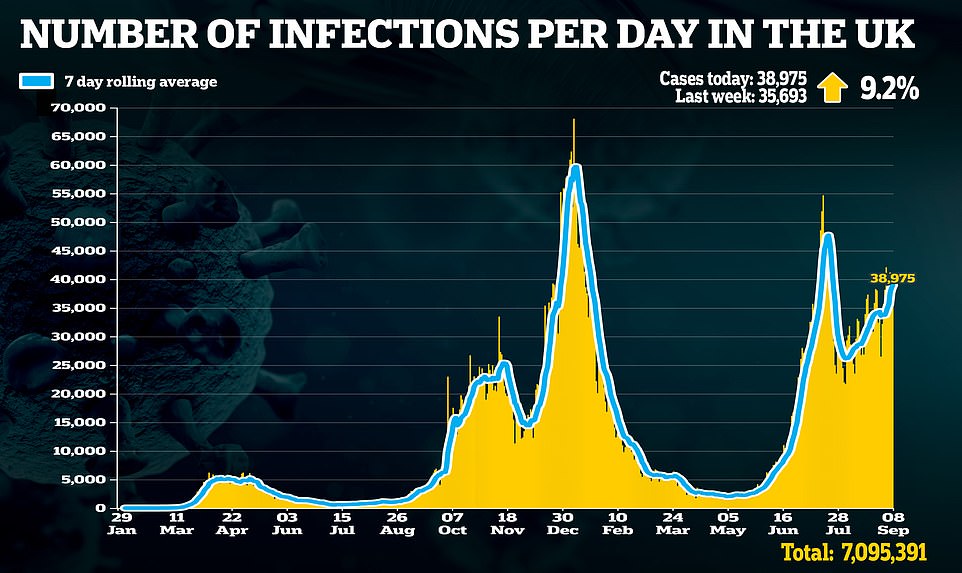
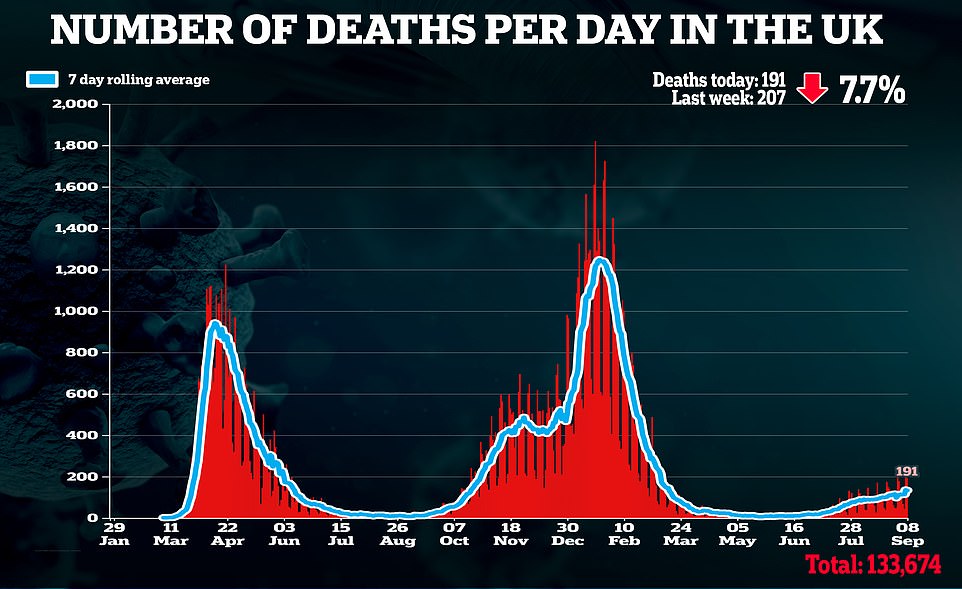
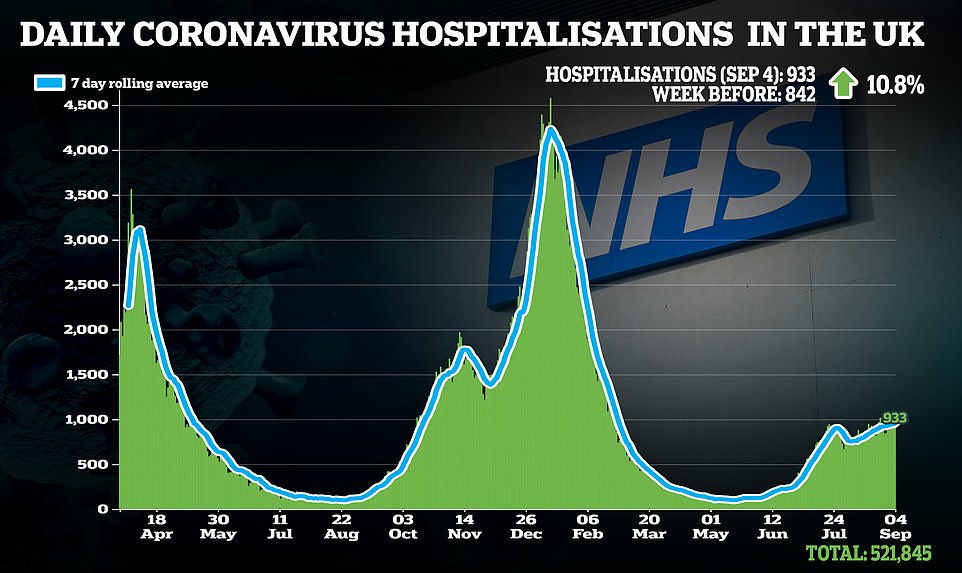
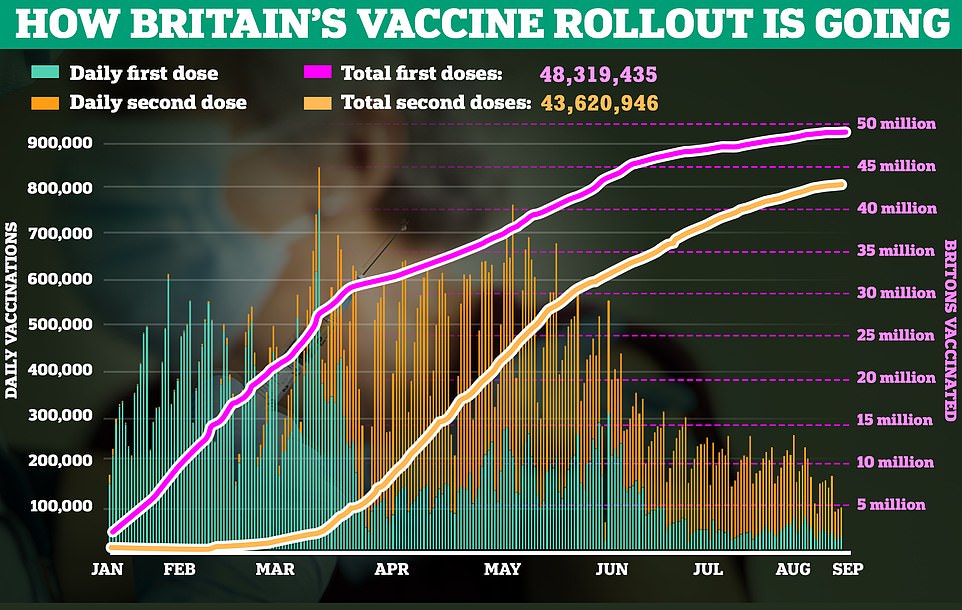
NHS pushes back against ‘unnecessary’ compulsory Covid jabs plan
NHS workers have pushed back against plans to make Covid jabs compulsory by winter.
The Government today launched a six-week consultation into plans to make vaccination a legal requirement to work with NHS patients.
Under the plans, around 120,000 frontline NHS staff who are still not vaccinated could be required by law to be jabbed to reduce transmission in hospitals.
But unions have hit out at the plans today, arguing mandatory vaccination is unnecessary because of high uptake rates.
Figures show 88 per cent of NHS staff are fully vaccinated and around 92 per cent have had a first dose, despite being first offered a jab last December. There are about 1.2million frontline staff in the health service in England.
The numbers are slightly lower in London, where there has been more hesitancy about vaccination, with only 86 per cent have had a first jab.
The Royal College of Nursing (RCN) expressed doubts over whether making jabs compulsory would increase the number of people taking up the offer of a vaccine.
And The NHS Confederation — which represents NHS trusts across England — said ‘the focus must remain on increasing vaccine confidence’ rather than forcing staff to take jabs.
A member of the Joint Committee for Vaccination and Immunisation (JCVI) — an independent body that advises the Government on vaccine policy — today said making jabs mandatory would feel ‘like an admission of failure’.
Advertisement
He continued: ‘For 521 days, ZOE and King’s College London have demanded cold and flu-like symptoms be recognised as common Covid symptoms and communicated widely as in other countries.
‘With UK rates the highest in Europe, if the government continues with no restrictions, surely we should at least help people to recognise the symptoms early and know when to stay at home.’
Meanwhile the NHS figures showed some 12.5 per cent of people — one in eight — who were transferred to Test and Trace in England in the week to September 1 were not reached, meaning they were not able to provide details of recent close contacts.
This is down slightly from 12.7 per cent in the previous week.
Anybody in England who tests positive for Covid, either through a rapid (LFD) test or a PCR test processed in a laboratory, is transferred to Test and Trace so their contacts can be identified and alerted.
But both King’s College and NHS Tests and Trace use delayed data, with official figures from the Department of Health showing an increase in infections since September 4.
The UK recorded 38,975 new positive tests yesterday — a jump of 9.2 per cent on the 35,693 recorded last Wednesday.
Hospital admissions with the virus also continued to increase at a similar rate, rising 10.8 per cent to 933 on September 4, the latest date data is available for.
It comes amid mounting pressure for a mass British booster vaccine programme as separate figures showed Scotland’s daily Covid hospital admissions rose by 50 per cent in a week.
Data from the Government’s Covid dashboard showed that on average there were 114 patients being admitted each day to hospitals in Scotland in the week to September 1, compared to 76 the week prior.
The number seeking treatment for the virus has risen steadily since schools went back from the summer break in the middle of August, when there were about 40 Covid admissions per day.
Daily hospitalisations are now at 60 per cent of the levels seen at the peak of the second wave, but patients are presenting with milder illness and being discharged quicker than earlier phases of the pandemic.
There were 883 Covid patients in hospital with the virus yesterday compared to more than 2,000 at the height of the winter wave in January — in a sign the vaccines are working.
Eighty-two patients were on mechanical ventilators by the most recent count on Wednesday and the country is recording seven deaths from the virus per day, on average.
The growing hospital numbers in Scotland come amid increasing calls for a more broad booster vaccine programme in the UK.
At the moment just half a million Britons with severely weakened immune systems are eligible but the Joint Committee on Vaccination and Immunisation (JCVI), is meeting today to decide who else should get them.
Professor Adam Finn, an expert in child health and JCVI member, insisted boosters are not needed in large numbers across the country and it’s ‘not clear’ that the UK is seeing waning protection against severe disease.
The JCVI is expected to recommend boosters only for the very elderly, more immunosupressed people and possibly those with severe underlying conditions.
Vaccine Minister Nadhim Zahawi, Health Secretary Sajid Javid and the Prime Minister all saying this week they want boosters to be given out and are preparing for a widespread rollout.
Source link : https://www.dailymail.co.uk/news/article-9973253/Number-Brits-catching-Covid-FELL-9-2-week.html











